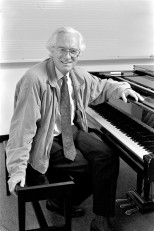Reinhold Brinkmann
(1934-2010)

Reinhold Brinkmann, a distinguished scholar whose writings on music of the 19th and 20th centuries made an indelible mark on musicology in Germany and the United States, died on October 10, 2010, after a long illness, in Eckernförde, Germany, at the age of 76. He taught in the Department of Music at Harvard University from 1985 until his retirement in 2003, serving as James Edward Ditson Professor of Music and department chair. Those who knew him will remember his brilliance, wit, and immense erudition, and his passionate devotion to the department and to his colleagues and students.
Brinkmann came to Harvard from Berlin, where he had been Professor at the Hochschule der Künste since 1980, and prior to that, Professor of Musicology at the University of Marburg. From 1976-80, he directed the Institut für Neue Musik und Musikerziehung in Darmstadt. He received his doctorate from the Universität Freiburg (with H. H. Eggebrecht) in 1967, and his habilitation from the Freie Universität Berlin (with Rudolf Stephan) in 1970.
In 2001, Brinkmann was the first musicologist to be awarded the prestigious Ernst von Siemens Musikpreis. His acceptance speech was a visionary declaration of what musicology could be. This musicology encompasses social and political aspects of music as well as rigorous analysis, and imagines new ways of communicating about music: «Ich sehe Musikwissenschaftler bei Poeten in die Lehre gehen und eine verständliche und doch reich nuancierte Sprache sprechen und schreiben.» His own work, with its lucid prose and forceful thinking, exemplifies this vision.
His writings span a broad range of topics, including the Second Viennese School (especially Schoenberg), the Romantic Lied tradition, Wagner, Skryabin, Varèse, Eisler, and Ives. Brinkmann’s scholarship extended to new music, and he enjoyed close friendships with composers Helmut Lachenmann, Wolfgang Rihm, and Luciano Berio, who dedicated his Sonata per pianoforte solo to him in 2001. Brinkmann’s work combines intimate knowledge of the music, often shown in meticulous analyses, with an awareness of its social and political backgrounds and ramifications. His publications include his nuanced and thought-provoking study of Brahms’s Symphonie Nr. 2, (Late Idyll, Harvard University Press, 1995, deutsche Fassung als Band 70 der Reihe Musik-Konzepte) and a volume on German musicians who fled Fascism, co-edited with Christoph Wolff, «Driven Into Paradise»: The Musical Migration from Nazi Germany to the United States (1999). His edition of Schoenberg’s Pierrot lunaire for the Schönberg Gesamtausgabe, in particular his book-length critical report on the work’s sources and its historical and biographical position, was a ground-breaking contribution to the Schoenberg literature. His 1967 dissertation, Arnold Schönberg, Drei Klavierstücke op. 11: Studien zur frühen Atonalität bei Schönberg, was republished in a second edition (with a new foreword) in 2000. A lifelong interest in German Lieder and poetry was reflected in his monograph, Schumann und Eichendorff: Studien zum Liederkreis op. 39 (1997) and in his substantial contribution on the 19th-century Lied tradition in the volume Musikalische Lyrik (2004). A selection of his essays in German, Vom Pfeifen und von alten Dampfmaschinen: Aufsätze zur Musik von Beethoven bis Rihm, appeared in 2006. At his death, he was working on a project called «Das verzerrte Sublime» about how the Nazi regime appropriated and misused the German classical musical tradition.
The international scope of Brinkmann’s work and influence is further reflected in two Festschriften, Music and the Aesthetic of Modernity, edited by Karol Berger and Anthony Newcomb and published with Harvard University Press (2005), and one produced by the Humboldt-Universität zu Berlin, where he held an honorary professorship, Musikalische Analyse und kulturgeschichtliche Kontextualisierung, edited by Tobias Bleek and Camilla Bork (2010).
Reinhold Brinkmann’s breadth of vision, critical intelligence, and deep humanity characterized his teaching and mentoring of students as well as his scholarship. Conversations always branched out from music to art, literature, architecture, sports, and history, and he always had time to talk. Most inspiring to his students was his conviction that musicology was not simply an academic discipline, but rather a deeply ethical undertaking that could have a real impact on the way we hear music and see the world. Musicology has lost a scholar of great insight and integrity, and we will miss him.

